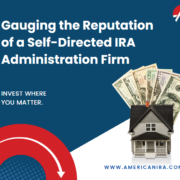Self-Directed IRAs-A Retirement Tool Or A Retirement Bomb?! American IRA Announces This ‘Almost’ Excellent Spot on Blog Post
Self-Directed IRAs-‘A Retirement Tool Or A Retirement Bomb?!’ American IRA-A National Provider of Self-Directed IRAs Announces This ‘Almost’ Excellent Spot on Blog recently posted by bgmwealth.com.
This blog post talks about a recent Minneapolis, Star Tribune article that reported on a Ponzi scheme that caused self-directed IRA holders to lose money. The blog goes on to explain that it is critical for self-directed IRA investors to use their “due diligence” in researching investments before releasing precious funds from their retirement accounts.
A further point this blog outlines is the importance of knowing which investments are allowed and which are not…also know as “Prohibited Transactions” with the key prohibitions being: self-dealing, stepped transactions, investing in disallowed assets such as collectible and antiques, and administration (making sure the IRA pays the bills it is required to pay). This brings them to a very good point that engaging in Prohibited transactions causes an IRA to be disqualified from its tax-deferred standing and also results in penalties.
Jim Hitt, CEO of American IRA, says “This is an excellent article and they have it correct on almost all points. It is important to exercise “due diligence”, it is important to make sure you avoid “prohibited transactions”, and it is critical that you select an IRA administrator who is experienced enough to help you stay informed about the latest on the rules of self-directed IRAs. The only point I disagree with is that they suggest ‘ if you do not expect returns higher than stock market returns, a self-directed IRA might not be worth the effort.’ On this point I would argue that the tax advantages in a self-directed IRA are worthwhile regardless as to the investment types held within that IRA. Regardless of any ‘hassles’, an IRA, Traditional or Roth, provides tax free compounding which mathematically can not be beat when compared to the non-tax advantaged world. Finally, I can’t agree more strongly with their suggestion that ‘While I often suggest people watch their investment expenses closely, this is one area where paying a little more for good advice is worth it. Outside of a custodian that knows how to do this, include your attorney and/or accountant from the beginning.’ Yes, due diligence is important and, of equal importance is consulting with professionals when you are investing in areas you are not an expert in.”


